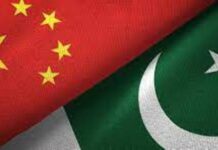From Our
Correspondent
BEIJING: London on Tuesday announced a sweeping ban on Huawei’s involvement in Britain’s 5G rollout, marking a U-turn in the country’s policy towards the Chinese telecoms company under pressure from Washington and domestic conservative groups.
As Secretary of State for Digital, Culture, Media and Sport Oliver Dowden made the announcement, he said, “it is the right one (decision) for the UK telecoms networks, for our national security and our economy, both now and indeed in the long run.”
As a matter of fact, this is both a wrong and bad decision for his country.
For starters, the security concerns the British government has evoked to ban Huawei simply do not stand. Huawei, like Nokia or Ericsson, is a private enterprise that is owned by its thousands of employees. Thus those who accuse the company of working for the Chinese government are simply lying.
So far, no one — not even U.S. Secretary of State Mike Pompeo and National Security Advisor Robert O’Brien who try to bite Huawei whenever possible — has been able to present any credible evidence to prove any security threat theories.
In fact, Huawei’s 91 commercial 5G contracts signed with partners worldwide, over half of which were signed in Europe, can also speak for the company’s quality in security management.
“We are probably the most open and transparent organization in the world. We are probably the most poked and prodded organization too,” John Suffolk, Huawei’s global cybersecurity and privacy officer, once said in an interview with the BBC.
Moreover, shutting out Huawei does not comply with Britain’s long-term interests. In fact, it will bring additional costs, colossal work, and an unpleasant customer experience for the country’s drive to build its own 5G infrastructure.
In a statement published shortly after the ban was issued, Ed Brewster, a spokesperson for Huawei UK, said the decision “threatens to move Britain into the digital slow lane.”
Over the decades, Huawei has played an integral part in building Britain’s 3G and 4G networks, with a proven track record. The Chinese company is also a leader in the field of next-generation telecommunications, with the most 5G patents globally as of 2019 and the largest share of 5G standard contributions, according to a study by market intelligence company IPlytics.
Vodafone and BT, both leading telecoms operators in Britain, use Huawei equipment extensively in their networks. According to a CNBC report, BT’s network currently consists of equipment from two-thirds Huawei and one-third Nokia, while Vodafone’s contains one-third Huawei and two-thirds Ericsson.
BT, meanwhile, warned of blackouts for customers throughout the country if it is forced to swap Huawei kit out for another vendor’s, while Vodafone said it would have to spend “single-figure billions” to carry out such an operation.
“I am concerned that an ultra aggressive imposition of a change in policy could hamper our economic recovery in the UK,” Andrea Dona, Vodafone UK’s head of networks, told British lawmakers last week.
Also, shutting out Huawei will result in less market competition, and more spending. Nokia and Ericsson, the only two other scale suppliers of 5G Radio Access Network equipment that can currently be used in Britain, offer service at a presumably higher price than Huawei’s.
More importantly, the ban will overshadow Britain’s cooperation with China, which has been gaining momentum in recent years, and is of particular significance for the European country to jumpstart a strong economic rebound in the post-Brexit and post-pandemic era.
British Prime Minister Boris Johnson said earlier this year that he is still committed to the “golden era” of the relations between China and Britain. Thus the British government should do its fare share in preventing external forces from making bad blood in its partnership with China.




